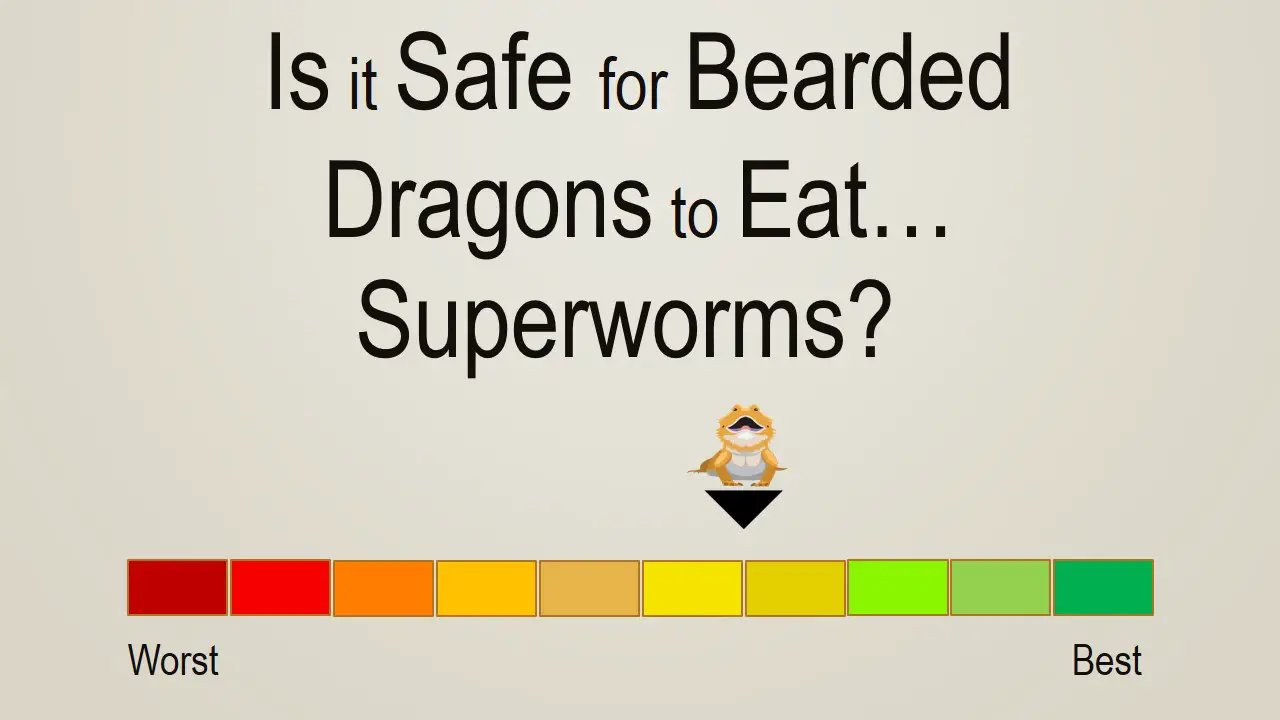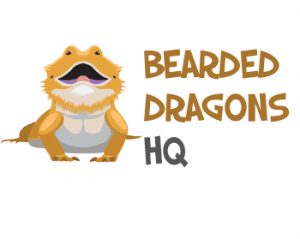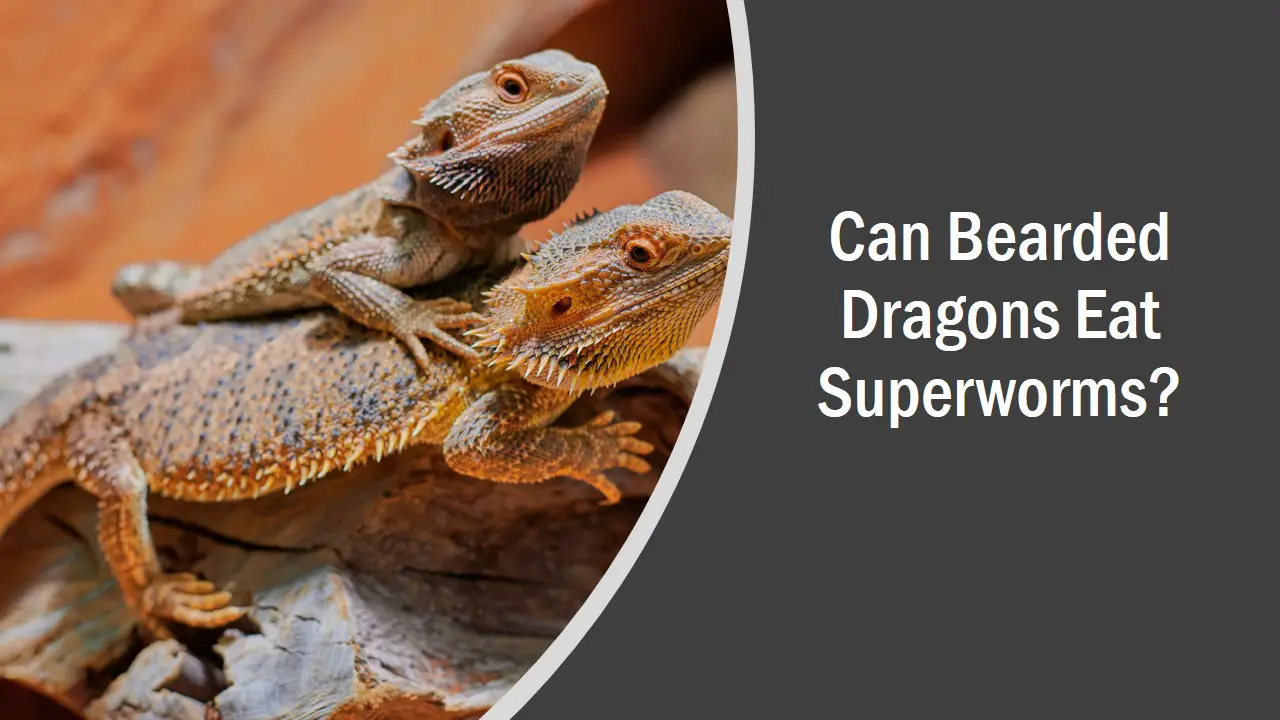Yes! Bearded dragons can absolutely eat superworms. In fact, bearded dragons love superworms. As a matter of fact, bearded dragons have a shortlist of insects that they love to eat – superworms being on top of that list.
Size does matter with superworms. Superworms are great for feeding juveniles and adults but as hatchlings may not be able to break them down fast enough to digest efficiently.
If your beardie has been eating smaller mealworms or is new to superworms you may want to make the switch gradually from smaller mealworms to larger superworms. If you find your dragon’s poop is loose, cut back a little bit on how many superworms per feeding. Check out the insects bearded dragons can eat.

What Are The Valuable Nutrients in Superworms?
Fat: Superworms are high in fat. Bearded dragons need a diet that contains a higher percentage of fat than protein and fiber. This is because they digest fat more quickly and the excess gets burned off.
Protein: Protein requirements for bearded dragons do not change much between juveniles, adults, or hatchlings. You can buy superworms with or without this nutrient added to them depending on your beardie’s needs.
Fiber: Fiber is an important part of bearded dragon diets as it helps digestion and controls constipation which is very common among captive reptiles. Adult bearded dragons do not normally need added fiber to their diet unless they have other disorders such as obesity, metabolic bone disease (MBD) or diabetes which could be brought on by a poor diet.
What Do Bearded Dragons Like to Eat with Superworms?
Bearded dragons eat superworms best when they are served alongside other insects. Some of the most popular include crickets, mealworms/mini mealworms, wax worms, silkworms and Dubia roaches. Roaches are high in protein so many keepers prefer to feed them during breeding months or for males who are being aggressive but offer all insects year-round as part of a varied diet.
How Many Superworms per Feeding?
Most bearded dragon owners feed their beardies 2-5 superworms per feeding depending on how active your dragon is, whether it’s an adult or juvenile and if it has other insects included in its diet.
What Are The Benefits of Feeding My Bearded Dragon Superworms?
Bearded dragons love superworms which means owners will have no problem getting their pets to eat them. Superworms are high in fat and protein so bearded dragon diets containing bugs should include these nutritious insects.
Superworms are high in calcium, phosphorus and vitamin D3 which is crucial for your bearded dragon’s bone development, absorption of calcium and the conversion of dietary vitamin D3 into its active form.
Vitamin A is another important nutrient that helps with eyesight, cell growth, immune function and reproduction. Adult beardies do not need additional sources of Vitamin A while juveniles may benefit from it depending on how long they are eating superworm dust.
How to Feed My Bearded Dragon Superworms?
Superworms can be fed in their current state or can be gut-loaded. Gut loading is feeding your beardie nutritious food to increase the nutritional quality of what it eats and maximize its health.
Some examples of nutritious foods include carrots, corn, green beans, broccoli and sweet potatoes. You can also use commercial gutload which comes with all the nutrients needed for bearded dragon digestion already included in them such as Repashy Bug Burger.
Superworms should always be coated with calcium three times a week to prevent any possible metal toxicity from supplements such as Repashy Calcium Plus or other high-calcium insects like Dubia roaches.
To coat the insects, sprinkle some powder over them and gently shake them until they are fully coated in calcium.
What Are The Risks of Feeding My Bearded Dragon Superworms?
Superworms can bite and pinch so feeding your beardie in a separate container would be best. Always check the superworm package for holes to ensure they aren’t infested with mites or other insects and buy from a reputable pet store or breeder that produces high-quality foods.
While superworms are not known to carry any parasites, it’s important to wash your hands before handing them over to your bearded dragon because you don’t want to get any infections from handling dirty bugs.
Insects
Alternative Foods for Bearded Dragons
Superworms are not the only high-protein, high-fat food available for bearded dragons. Other insects with these nutritional values include silkworms, mealworms/mini mealworms, wax worms and crickets so you can use any of these instead to mix up your pet’s diet.
Never forget to mix in some leafy greens, vegetables and fruits such as romaine lettuce, kale, carrots and oranges to make sure your bearded dragon gets all the vitamins and minerals it needs in addition to its nutritious bugs. You can also supplement with liquid calcium if you notice your beardie’s bones aren’t developing properly or after a molt when they need stronger bones and thicker skin.
What Do I Need To Know About Feeding My Juvenile Bearded Dragon Superworms?
Juvenile bearded dragons should be fed 2-5 superworms 3 times a week as part of a varied diet alongside other insects. They can be gut-loaded just like adults but also have an increased risk of choking because their throat is smaller than the rest of their body. This makes it harder for them to swallow superworms if they are too large.
Anyone feeding an individual superworm should choose a size no bigger than 1.5-2″ in length so they don’t have any trouble eating them. Dusting feeding insects with a calcium powder will also be needed to prevent any problems with their bones and growth development.
Can Bearded Dragons Eat Superworms? – The Conclusion
Bearded dragons can eat superworms as part of a varied diet that includes other nutritious foods such as vegetables and fruits. Superworms should be fed to juvenile bearded dragons no more than three times a week and only if they are smaller than 1.5-2″ long. They should always be coated in calcium powder and gut-loaded once or twice a week to provide them with more nutrients.
Never feed your beardie large superworms because they could get stuck in their throat and choke on them, which is very dangerous for your pet. Bearded dragons need a wide range of vitamins, minerals and amino acids to stay healthy so you must include leafy greens, vegetables and fruits into their diets alongside reptiles such as crickets, silkworms, mealworms/mini mealworms, wax worms and superworms.

